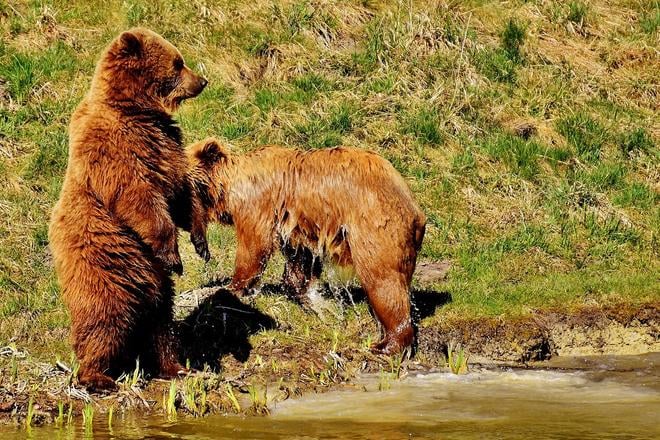The recent case of the killing of a man by a bear in the Liptov region has once again raised questions about how to behave during bear encounters in a forest or near human dwellings, or even better: how to avoid a bear.
The head of the Brown Bear Emergency Team, Jaroslav Slašťan, claims that bear encounters with humans mostly occur due to the fact that the person does not know how to behave when meeting the bear or how to behave in the area where bears live.
Here is an overview of answers to practical questions that are good to know before you find yourself in front of a brown bear:
The questions we answer in the text below:
How to avoid an encounter with a bear in the woods
The risk of encountering a bear is lower when you walk in a group on marked trails and during daylight. In case of poor visibility or audibility, if you are moving against the wind or running water, loud whistling, clapping, or talking will help to give the bear a chance to react and avoid you.The risk of encountering a bear is lower when you walk in a group on marked trails and during daylight. In case of poor visibility or audibility, if you are moving against the wind or running water, loud whistling, clapping, or talking will help to give the bear a chance to react and avoid you.
Where and when should vigilance be increased?
Be especially careful in the morning, in the evening and at night. But also, during the day in dense vegetation or near their food sources. It is also important to take note of traces, droppings, and leftover food. You should be especially careful in dense vegetation, in places with an abundance of wild berries and near carcasses.
How not to lure a bear to human settlements
In the case of dwellings in wooded areas, municipal waste must be stored in such a way that bears cannot get to it. During all tourist activities, it is necessary to keep all sites clean and free of lures, clean the fire area, containers, and dishes immediately after use.
Do not leave leftovers near cottages or in the surrounding nature but take them with you. Fruit near houses should be harvested immediately after ripening and rotten fruit removed as soon as possible.
How to camp the right way
When camping, avoid the places close to animal trails, locations with abundant bear food and the presence of synanthropic individuals (they have lost their natural shyness and eat garbage). Do not cook inside or in close proximity to your tent, and do not leave foul-smelling food (meat products, open cans, etc.) next to you at night.
What behaviour can prevent a bear from attacking you?
Meeting a bear does not necessarily mean that it will attack you. Bears more often attack people who are "active" during encounters - they approach a bear, take photos, try to scare the bear away, compared to those who remain "passive" - they watch, are silent, retreat. Never approach a bear, even if it seems calm.
Run or stand still?
In the event of an unexpected encounter with a bear (closer than a hundred metres), it is recommended to increase your distance from the bear, but not by running away, which could provoke the bear into chasing you. Also avoid looking directly into the eyes. Animals see this as a sign of aggression.
How to read a bear’s body language
Some signals of restlessness and stress are inconspicuous - such as numbness and a change in body orientation, or unnatural yawning. Others are more obvious - whining, muttering, and chattering teeth.
Very tense aggressive manifestations include drooling, rapid wheezing, growling, and growling with an open mouth, pawing, and throaty noises, such as a roar.
A bear standing on its hind legs is only trying to check the situation, it is not an aggressive position!
A bear in self-defence sometimes makes a lunge, warning you to move away. Following a person’s inappropriate reaction to this lunge, it may escalate into an attack. But it usually ends before physical contact occurs.
Should you actively defend yourself if a bear attacks you?
The defending bear usually stops attacking when it finds that you are no longer a threat. Active defence could prolong the attack and increase the likelihood of serious injury.
Experts recommend passive defence: lie on your stomach facing the ground, use shoulders and arms to protect your head and neck, and remain motionless ("play dead") until the bear leaves.
If the bear turns you over, return to your original position so that your abdomen and other vital organs are protected.
What is the best way to scare off a bear?
The best way to repel an attacking or threateningly behaving bear is considered to be bear pepper spray. Bear spray should be at least 225 g and contain 1-2 percent of capsaicin. The spray should provide at least six seconds of spraying with a reach of at least 7.5 m.
Whom should you inform about a bear outside human dwellings?
If the bear moves naturally near cattle, apiaries, orchards, camps, etc., but does not cause damage and escapes when it sees a human, there is no need to contact anyone. If it causes damage or goes there regularly, you should contact the administration of a national park or a protected landscape area.
Where to call if you notice a bear in a populated area?
If the bear goes to the area regularly, stays there, looks for waste, ignores people nearby and has lost shyness in front of them, it is necessary to find a safe place (building, vehicle) and contact the emergency line (158, 112, 159) or the Brown Bear Emergency Team. (+421 903 201 879).
Whom to inform about an aggressive bear?
If a bear comes close to people living in a populated area, if it is a female bear with cubs, an injured bear, a bear looking for waste or food, a bear in a building, if it behaves aggressively, chases people, does damage or attacks people, you must not approach the bear under any circumstances, provoke or feed it. You need to find a safe place and contact the emergency number.
Source: Brown Bear Emergency Team
©Sme
Author: Elena Akácsová


